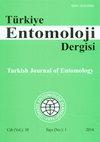IF 0.9
4区 农林科学
Q3 ENTOMOLOGY
Turkiye Entomoloji Dergisi-Turkish Journal of Entomology
Pub Date : 2022-09-01
DOI:10.16970/entoted.1107144
引用次数: 1
摘要
2018年和2019年在Ondokuz Mayıs大学农学院植物保护系实验室和大棚进行了13种香料水提液对圆线虫(Meloidogyne arenaria,尼尔,1889)和Chitwood, 1949(圆线虫科:圆线虫科)的杀线虫效果的研究。以香料提取物浓度0.5、1%和2%为对照,对二龄幼鱼的孵化、死亡率和不动性进行了室内试验。丁香(Syzygium aromaticum L., Myrtales: myrtacae)在浓度为2%时对js的不动性和死亡率影响最大。提取物对js的影响小于卵的孵化。在室内实验的基础上,选择5种有效的香料提取物进行盆栽实验。将这些提取物分别施用于接种3000个线虫卵的2% ~ 200 g土壤中,然后将感病番茄幼苗移栽到土壤中。接种45 d后,测定根瘿指数和线虫虫卵数量,计算线虫繁殖系数。除孜然、孜然(Cuminum cyminum L., Apiales: Apiaceae)外,所有提取物均降低了根瘿指数和繁殖因子。罗勒、basilicum L. (Lamiales: Lamiaceae)提取物对线虫繁殖的抑制程度最大,其次是姜黄、姜黄(Curcuma longa L.)和丁香提取物。本文章由计算机程序翻译,如有差异,请以英文原文为准。
Bazı baharat ekstraktlarının Meloidogyne arenaria (Neal, 1889) Chitwood, 1949 (Tylenchida: Meloidogynidae)’ya karşı nematisidal potansiyellerinin araştırılması
Experiments were conducted in the laboratories and greenhouses of Plant Protection Department, Agricultural Faculty, Ondokuz Mayıs University in 2018 and 2019 to investigate the nematicidal effects of aqueous extracts of 13 spices on Meloidogyne arenaria (Neal, 1889) Chitwood, 1949 (Tylenchida: Meloidogynidae). Spice extract concentrations of 0.5, 1 and 2% were tested in laboratory experiments for inhibition of egg hatching, mortality and immobility of second-stage juveniles (J2s). When used at a concentration of 2%, clove, Syzygium aromaticum L. (Myrtales: Myrtaceae) caused the greatest immobility and mortality of J2s. The extracts had a lesser effect on J2s than the egg hatching. For the pot experiment, five effective spices extracts were selected based on the laboratory experiments. These extracts were applied at 2% to 200 g of soil inoculated with 3,000 nematode eggs then susceptible tomato seedlings were transplanted into the soil. Forty-five days after inoculation, the gall index and the quantity of nematode eggs on roots were determined and reproduction factor of nematode calculated. All extracts, except cumin, Cuminum cyminum L. (Apiales: Apiaceae), reduced root gall index and the reproduction factor when compared to control. Basil, Ocimum basilicum L. (Lamiales: Lamiaceae) extract reduced nematode reproduction the greatest degree, followed by turmeric, Curcuma longa L. (Zingiberales: Zingiberaceae) and clove extracts.
求助全文
通过发布文献求助,成功后即可免费获取论文全文。
去求助
来源期刊
CiteScore
1.60
自引率
12.50%
发文量
38
审稿时长
>12 weeks
期刊介绍:
The Turkish Journal of Entomology is a quarterly journal which has been published by Entomological Society. Turkish Journal of Entomology publishes original research articles in the fields of entomology and agricultural zoology in English. Authors whose native language is not English should have their paper edited professionally prior to submission. Before preparing the typescript for submission, examine the format of manuscripts already published in Turkish Journal of Entomology.
According to TJE rules, biological observations made in one location in only one-year, short notes in which the first record of a single species in Turkey is announced, and research which is older than five years will not be accepted for publication unless it forms part of a longitudinal study.

 求助内容:
求助内容: 应助结果提醒方式:
应助结果提醒方式:


